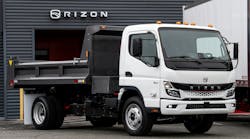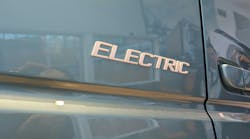When potential customers see a product in action, it can create a positive and lasting impression. The Ford Transit Connect has created many of those since its introduction. Now, Ford is introducing an all-electric version of the vehicle and Johnson Controls, makers of the vehicle's lithium-ion battery, is among the first customers to deploy the van. Glendale, WI-based Johnson will begin rolling out the first of 20 Ford Transit Connect Electrics in its fleet this month.
“I think one of the keys [for us] to use it is to demonstrate we're very comfortable with the battery, we're very comfortable with the vehicle,” says John Schaaf, vice president-market development, technology & innovation for the company's Power Solutions division. “We're elated to be taking delivery of the vehicle.”
According to Schaaf, the company is not viewing these vehicles as test vehicles, but rather as full-functioning members of the company's service fleet.
Johnson Controls Saft, a unit of Johnson Controls, is supplying the battery to Ford. Ford is sending Transit Connect “gliders” to Azure Dynamics, which is combining its electric drivetrain, Johnson's battery, and the glider in a final zero-emissions package. Azure is assembling the vehicles in Michigan, and Johnson is producing the lithium-ion batteries in Holland, MI. The battery produces 28.8 kW/hr. of power and was purpose-built for the Transit Connect, Schaaf says.
THE RIGHT FIT
The decision to deploy the electric version of the vehicle, though, had less to do with who made the battery and more to do with the fit the Transit Connect makes within the Johnson Controls service fleet. The company, which counts about 6,500 vehicles in its U.S. fleet and more than 19,000 worldwide, uses a mix of Class 1-2 General Motors and Ford vans. Since the introduction of the Transit Connect, more of those have made their way into the fleet, particularly for technicians and electricians who don't haul heavy payloads. Johnson Controls is now introducing the electric version.
“We think, not only electric vehicles in general, but this vehicle in particular, is a good fit because it's a nice size,” says Schaaf, who also mentions that the company did a complete analysis of payload, size, and driving range before making the purchase. “Electric vehicles will have a very good place in our fleet where [they're] appropriate.”
The 20 vehicles will be put into operation in the Building Efficiency division, which provides products and services for commercial buildings. “For technicians (and electricians) who have light commercial buildings [to service], the Transit Connect Electric is very appropriate,” Schaaf adds.
The vehicles, which have a driving range of 80 mi. and take five to seven hours to fully recharge, have been met with great enthusiasm among the company's employees, as well as customers whose buildings will be serviced by the technicians driving the Transit Connect Electric.
According to Schaaf, the decision to deploy the vehicles was not as simple as making the choice to purchase them.
“We did a survey to not only look at the technician who would be driving the vehicle, but also the managers who would be managing the resource,” Schaaf says. What the survey revealed, he says, was that 62% of employees were either “interested” or “very interested” in driving an electric vehicle.
From there, the company looked at a technician's workday — how many miles did they drive and was it a dedicated route? It also surveyed customers to be sure they were interested in participating in the program (Johnson Controls has installed charging stations at those customer sites where the vehicles will be parked most often). The response was overwhelmingly positive, Schaaf says.
One final obstacle needed to be overcome, though. Because of the nature of their work, technicians take their vehicles home at night. How were they going to charge these vehicles? The answer, it turned out, was to install a home charging unit on the property of each technician. Johnson paid for those.
“We put more charging stations in than we needed,” Schaaf says, but the company will be able to refine its needs going forward as more data on the vehicles and charging requirements becomes available.
ALTERNATIVE FOCUS
Utilizing the Transit Connect Electric is just one approach to sustainability that the company is taking in its vehicle fleet. Schaaf says Johnson Controls will operate 511 Ford Escape Hybrids by the end of the year, and the company is getting ready to begin implementing start-stop technology, which it also manufactures, in vehicles in the future. Start-stop technology enables the engine to shut down automatically when a vehicle idles for too long, such as at a stoplight, and restarts the engine upon the depression of the accelerator. Schaaf says testing of that system shows a 5-12% savings in carbon dioxide.
“We expect that over time, all our vehicles will have some form of [alternative power] technology,” he says, “the [Transit Connect Electric] being just one of those options.”


